Genovevo, age 58, has been imprisoned twice and on three occasions has been arrested for criminal dangerousness. He is a ‘house agent’, as they call those who — under the table — dedicate themselves to transmit trades, purchases, or sales of houses in Cuba. A business where there isn’t anyone to tell the tale.
“The acquisition or sale of houses was something prohibited by national law. People with money on the island or foreigners married to Cubans do whatever is possible to buy themselves a house. That’s when I appear. I have good contacts in the Housing Institute — the most corrupt of the agencies — and I manage all the legal paperwork. Besides, I’m a guy you can trust”, says Genovevo.
The housing problem in Cuba is as old as the revolution. And as complex. Until June, state enterprises had only finished 8,831 of the 23,394 houses they had promised to build in 2011. Private builders had finished 3,206 of the 19,606 (houses) forecast for this year. To that we add that of the construction materials destined for the populace to repair or extend their homes, in the first semester only 15.6% had been sold.
It’s true that 85% of the citizens are owners of their homes. But the State prohibits them from selling them. And in the case of a legal exit from the country, if a relative isn’t named who lived with them for many years under the same roof on the ownership title, the government seals the property and keeps the abode.
So it has been going until now. General Raul Castro has promised that things are going to change. In the 6th Congress of the Communist Party, which took place in April 2011, the buying and selling of houses was authorized. In the same manner, they’re thinking about abolishing a series of bureaucratic forms regarding swaps.
But in Cuba everything moves at a tortoise’s pace. And, although many citizens want to sell or buy a house, the functionaries say that they haven’t been given the green light yet.
Luisa, age 34, married to an Italian already has everything arranged to acquire a residence. She is awaiting the permit from the government. “They told me July, when the parliamentary sessions take place, they will ratify the means to do so. Meanwhile, you can’t buy nor sell houses”, she indicates in the vicinity of the Housing Institute.
But guys like Genovevo don’t stop for government prohibitions. “Now is when I have more work. The usual housing market is very active. People know that when sales are legalized, the prices will double. If today an apartment is worth 15,000 dollars, the following day it will cost 30 thousand. A mansion the same way: if now it costs 40 thousand, I don’t doubt it will reach 80 or 90 thousand dollars”, he assures.
Automobiles aren’t staying behind. In this time, in Havana a 60-year-old car in a well-preserved state can cost more than an apartment. According to the house ‘agents’, this tendency is going to revert.
“I believe that in no place in the world would a car be worth more than a house. But Cuba is a strange country, where the abnormal is normal and vice-versa. Those who want to buy houses are desperate. They know that properties are going to appreciate, the same as land”, Susana — an expert ‘agent’ clarifies.
Trading is also complicated on the island. Owing to a group of absurd regulations, the owner has to testify or justify why, for example, he wants to trade a 3-room apartment for a house with a garage and 5 rooms. The state functionaries, first-rate scoundrels, smell money under the table and begin to block or obstruct the trade, in search of a cut off the top.
“In Cuba, when a family trades its house for a better one, with more square footage, there is always money in between. If they don’t “square up” with the Housing Institute inspectors, the swap doesn’t take place. I tell you as someone who’s made enough money in this business”, says Esther, ex-functionary, who thanks to her job could make sufficient dollars to get a good residence and a good car.
The ‘agents’ of trades and houses are accustomed to collecting 10% of the money that moves in a transaction. Sometimes more. Genovevo, an ace of the deal, has closed deals with earnings up to 10 thousand dollars. And although they have caught him twice infringing laws and have put him behind bars, the money and his influence have been valuable in being placed in conditional freedom before a year has gone by.
Today he lives on a well-furnished floor, with an enormous 52 inch plasma television in the living room. He has gotten good houses for his three children. He has money for certain luxuries. “Nothing from the other world. To eat seafood in the Chinese neighborhood and occasionally lay down with a whore. That which I like most is going out to fish on the weekends. And the only way to get money is being a ‘house agent’, a job where I feel fulfilled”, he underlines while he drinks mango juice.
And if in the deal Genoveno isn’t going to earn a minimum of 2 or 3 thousand dollars, please don’t bother him.
Photo: Ketari. A section of the Paseo del Prado, in the heart of Havana, has turned into a meeting point for ‘house agents’ and for people who want to trade their home. Since no legal office exists for these exchanges, the people do it themselves, rustically, using notebooks with handwritten notation or tacking sheets with proposed exchanges on the trees, as you see in the photo.
Share on Facebook
Translated by: JT
August 5 2011

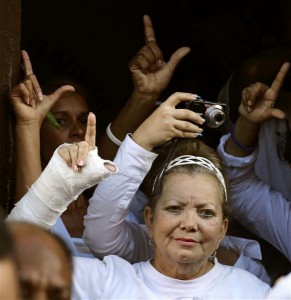
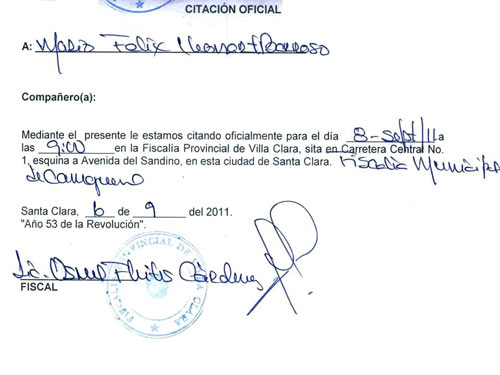
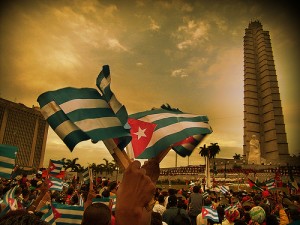 In 52 years of Revolution, Cubans have become used to attending parades and events. Not always spontaneously. The members of rapid response brigades — paramilitary shock troops — are called to hold repudiation rallies and verbal lynchings against opponents, in particular against the Ladies in White.
In 52 years of Revolution, Cubans have become used to attending parades and events. Not always spontaneously. The members of rapid response brigades — paramilitary shock troops — are called to hold repudiation rallies and verbal lynchings against opponents, in particular against the Ladies in White.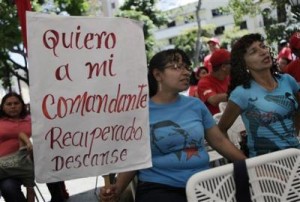 When some days ago the Venezuelan chancellor Nicolás Maduro read a plain official note, announcing that President Hugo Chávez Frías, aged 54, would be undergoing surgery in the lower abdomen, few in Cuba paid attention.
When some days ago the Venezuelan chancellor Nicolás Maduro read a plain official note, announcing that President Hugo Chávez Frías, aged 54, would be undergoing surgery in the lower abdomen, few in Cuba paid attention.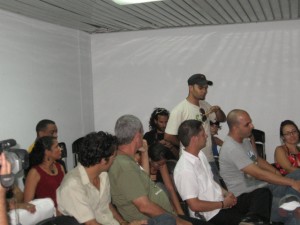 Like two boxers who stare each other in the eye, before beginning their attack, came TwittHab, the first encounter between official and alternative ‘twitterers’. If the proposition was to fraternize and build bridges, this first exploratory round between virtual gladiators who’ve made blogs, Facebook and Twitter a tool for spreading their ideas, was below expectations.
Like two boxers who stare each other in the eye, before beginning their attack, came TwittHab, the first encounter between official and alternative ‘twitterers’. If the proposition was to fraternize and build bridges, this first exploratory round between virtual gladiators who’ve made blogs, Facebook and Twitter a tool for spreading their ideas, was below expectations. I have received an unexpected gift: a ship’s log with my name on it. Marco A. Pérez López and Liu Santiesteban, administrators of Tania Quintero’s blog, opened it for me.
I have received an unexpected gift: a ship’s log with my name on it. Marco A. Pérez López and Liu Santiesteban, administrators of Tania Quintero’s blog, opened it for me.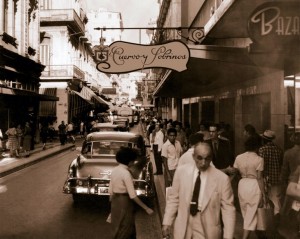 Nicolas, aged 46, has a special nose for a good deal. Big goals are always planned. In those moments, in his well-kept house in the Reparto Sevillano, he meticulously examines various catches and pieces of gold.
Nicolas, aged 46, has a special nose for a good deal. Big goals are always planned. In those moments, in his well-kept house in the Reparto Sevillano, he meticulously examines various catches and pieces of gold.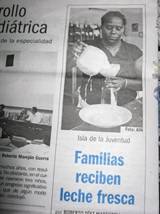 Just a few days ago we celebrated Farmers’ Day. Its highest leader, among other things, expressed that he couldn’t continue extracting and transporting fresh milk, nor offering it to the people with such precarious hygiene.
Just a few days ago we celebrated Farmers’ Day. Its highest leader, among other things, expressed that he couldn’t continue extracting and transporting fresh milk, nor offering it to the people with such precarious hygiene.